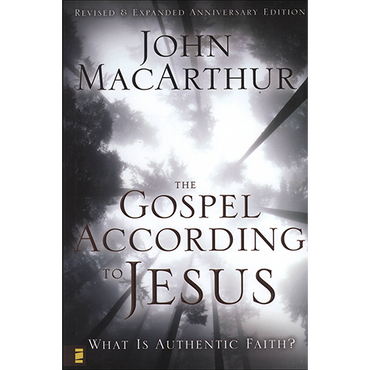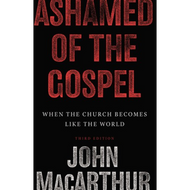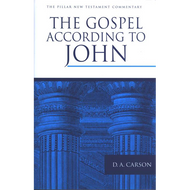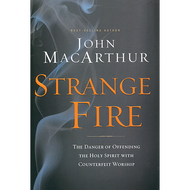Categories
Categories
The Gospel According to Jesus by John MacArthur (Hardcover)
Product Description
About the Author
John MacArthur is the pastor-teacher of Grace Community Church in Sun Valley, California, president of the Master’s College and Seminary, and featured teacher with the Grace to You media ministry. In more than four decades of ministry, John has written dozens of bestselling books, including The MacArthur Study Bible, The Gospel According to Jesus, and Slave. He lives in Los Angeles.
Publisher's Description
The first edition of The Gospel According to Jesus won wide acclaim in confronting the “easy-believism” that has characterized some aspects of evangelical Christianity. Over the past 50 years, a handful of books have become true classics, revered world-wide for their crystal-clear presentation of the Gospel and lauded for their contribution to the Christian faith. These extraordinary books are read, re-read, and discussed in churches, Bible study groups, and homes everywhere. John MacArthur’s The Gospel According to Jesus is one of those books. In The Gospel According to Jesus, MacArthur tackles the idea of “easy believism,” challenging Christians to re-evaluate their commitment to Christ by examining their fruits. MacArthur asks, “What does it really mean to be saved?” He urges readers to understand that their conversion was more than a mere point in time, that, by definition, it includes a lifetime of obediently walking with Jesus as Lord. This 20th anniversary edition of MacArthur’s provocative, Scripture-based book contains one new chapter and is further revised to provide Christians in the 21st century a fresh perspective on the intrinsic relationship between faith and works, clearly revealing Why Jesus is both Savior and Lord to all who believe.
Endorsement
In my opinion, John MacArthur has hit a homerun with this book. If it were up to me, this book would be required reading for every pastor in America, but particularly pastors of megachurches, since an increasing number of megachurches are slipping into the easy believism that MacArthur successfully refutes here.
In a nutshell, MacArthur attempts to take on the concept that people can make allegedly sincere professions of faith in Christ and then be considered a Christian with certain eternal security even if their life bears no good fruit after their supposed conversion. This is an important question, both from a theological standpoint as well as from a Christian living perspective. An increasing number of churches, particularly a number of megachurches, have appeared to shy away from topics that remind people of the reality of sin, the need for repentance and forgiveness, and the important desire of being obedient to God and His Word because such sentiments are increasingly unpopular within the realm of comfortable Christianity. MacArthur argues that good works are not a precondition of salvation, thus affirming the historic Protestant position of salvation by faith alone in Jesus Christ and relying on His grace. But having affirmed this position, MacArthur then goes into fabulous Biblical detail concerning the FRUITS by which genuine salvation can be measured. Critics of MacArthur's book have argued that MacArthur is preaching a works based salvation, but I think it's clear that MacArthur is not doing that. What he is saying is exactly what the Bible says, and what the historic Christian church has long affirmed - that salvation is by faith alone in Jesus Christ, and that genuine faith in Christ will produce good works via the influence of the Holy Spirit that is indicative of genuine salvation and the genuinely changed life that the Bible repeatedly speaks of for people who are truly converted. If critics want to call this a works based salvation, I believe this to be a serious oversight of the clear distinctions MacArthur makes between salvation by faith, versus the logical and Biblically outlined fruits of genuine salvation.
MacArthur further demonstrates that those who affirm easy believism and decry this as a works based salvation stand on extremely problematic ground relative to their own position on salvation. MacArthur points out that it is highly dubious to offer an easy believism salvation that basically states that as long as we make some kind of supposedly sincere affirmation of Jesus, we can then claim we are saved while continuing to live an unsaved life and not worry about whether our salvation is certain or not. This is an extraordinarily cheap form of salvation as a matter of Christian living. And I also believe it is catastrophic as a matter of theology. If all are agreed that the Holy Spirit enters a person's life upon faith in Christ, and all are agreed that the Holy Spirit is fully divine, how do the proponents of easy believism reconcile the notion that someone who is supposedly right with God and who has the Holy Spirit in them can continue to live an apostate life? What does that say about the omnipotence of the Holy Spirit if the Spirit can enter someone, but not change them? It seems to me that to believe in the concept of the 'carnal Christian' who never repents, never seeks forgiveness, never acknowledges sin, and never seeks to be obedient to God - all the while claiming that the Holy Spirit is in this person, almost automatically forces an argument for the impotence of the Holy Spirit as a matter of theology. Not only does this not make sense and cheapens both the Christian life and the Christian God, it results in a different gospel.
In conclusion, I believe that MacArthur has written an important book that is well documented Biblically. The Bible does not teach the concept of apostate Christians, it does not teach easy believism. It does teach that salvation is by faith, and that when a person makes a truly sincere profession of faith in Christ, the Holy Spirit will enter that person, and change that person over time by conforming him/her to the image of God. It does not teach that someone can make a profession in Christ at some point, and then God leaves that person alone to continue living a life that doesn't look any different from the life they lived prior to professing Christ. Nowhere does the Bible say that. So I am very happy to see MacArthur meticulously deconstruct the tenets of easy believism in favor of what both Jesus and the apostles repeatedly affirmed throughout the New Testament about the nature of salvation and living the Christian life.
 Loading... Please wait...
Loading... Please wait... 










